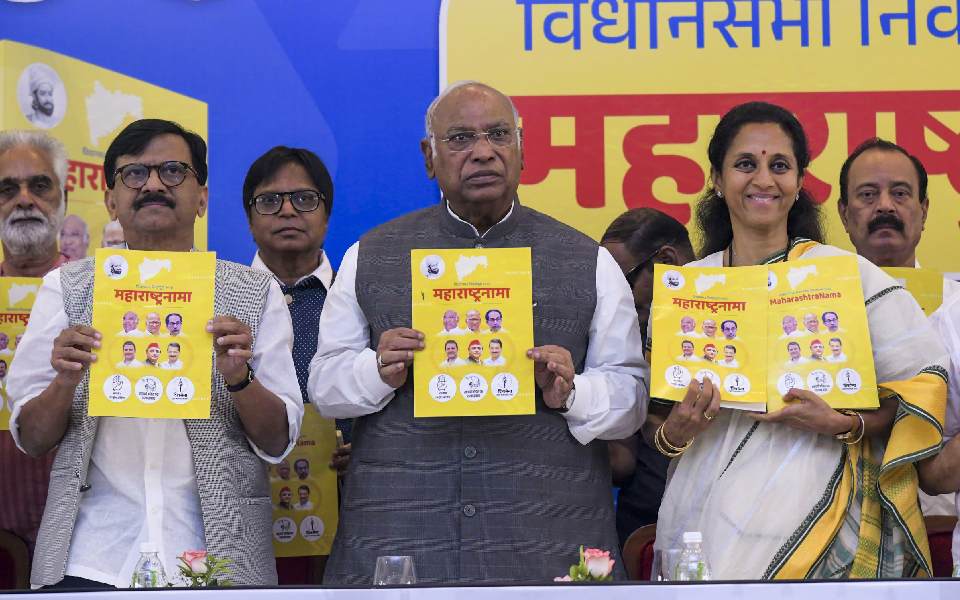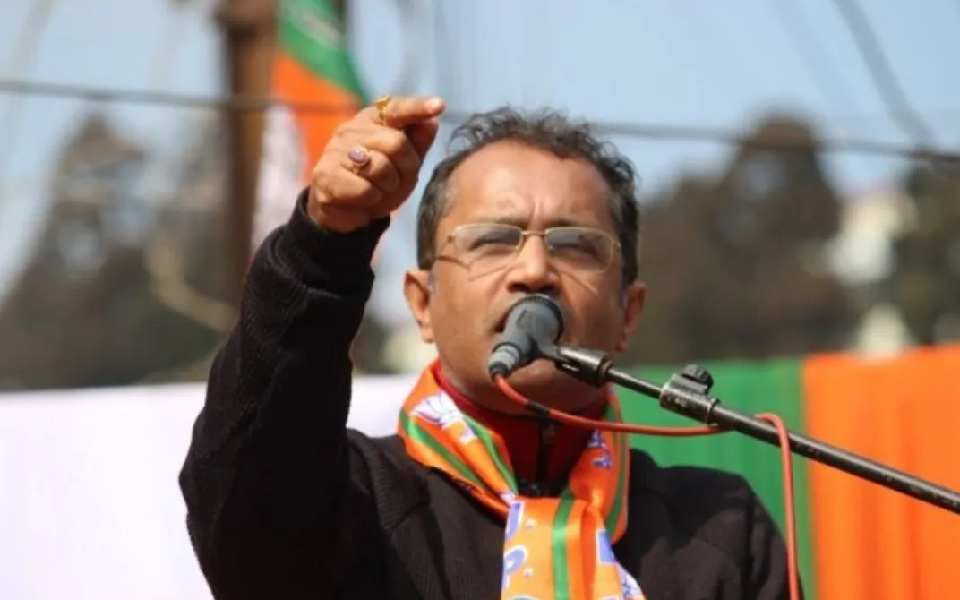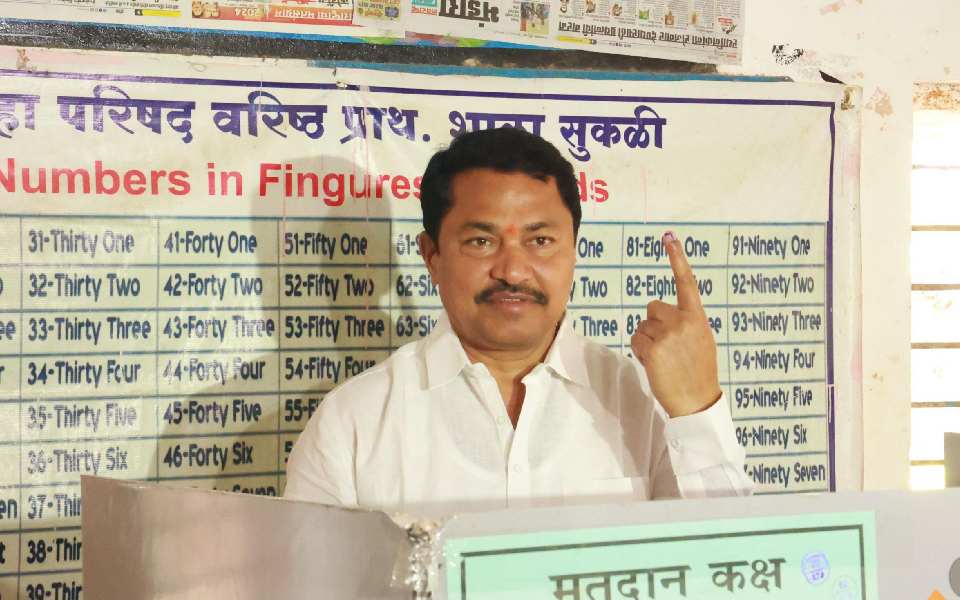Mumbai, Nov 10: The opposition MVA on Sunday released its manifesto for the November 20 Maharashtra polls, promising free cervical cancer vaccines for girls aged 9 to 16 and two optional leave days for women employees during menstruation.
The manifesto, titled ‘Maharashtranama’, assured a caste-based census, and monthly financial assistance of Rs 3,000, free bus travel and six cooking gas cylinders every year at Rs 500 each to women.
It also promised to frame a 'Nirbhay Maharashtra' policy and enforcement of the Shakti law for the safety of women and children, besides a dedicated ministry for child welfare.
The MVA also assured to provide Rs 1 lakh each to girls on attaining the age of 18 years.
Congress president Mallikarjun Kharge released the manifesto of the Maha Vikas Aghadi (MVA) for the state elections at a press conference in Mumbai where NCP (SP) working president Supriya Sule and Shiv Sena (UBT) MP Sanjay Raut were also present.
Spelling out its theme, he said MVA’s vision for Maharashtra’s progress is based on five pillars – agriculture and rural development, industry and employment, urban development, environment and public welfare.
If voted to power, women in Maharashtra will receive Rs 3,000 per month under the Mahalaxmi scheme and will be entitled to free bus travel, he said. The state’s ‘Ladki Bahin’ programme currently provides eligible women monthly aid of Rs 1,500.
Kharge the MVA government will carry out a caste census and remove the 50 per cent ceiling on reservation as has been done in Tamil Nadu.
Replying to questions on populist schemes announced by the MVA after criticising the ruling Mahayuti for the same, Kharge said, “Give us government and we will give you the budget.”
MVA’s victory over the BJP-led Mahayuti is important for the progress and development of the state, he said.
The Congress president said that in Karnataka, Rs 52,000 crore has been budgeted for the implementation of guarantees and the budget and expenditure details are available.
“We did not lie. If you are determined to help the poor, you will find a way out,” he said.
Sule and state Congress president Nana Patole said enough funds will be available if the cost escalation in infrastructure projects and corruption are checked.
Kharge denied that some populist schemes, similar to the Mahayuti government's Ladki Bahin Yojana, are meant to influence voters.
“It is about ideology to provide social security,” he said.
Every family will get a health insurance cover of Rs 25 lakh along the lines of a scheme started by the earlier Ashok Gehlot government in Rajasthan, Kharge said.
The manifesto promises free cervical cancer vaccines for all girls aged 9 to 16 and two optional leave days for female employees during menstruation. It also promises to formulate an inclusive policy to ensure opportunities for differently-abled and LGBTQIA+ individuals across all sectors.
For farmers in the state, apart from debt waiver up to Rs 3 lakh and Rs 50,000 incentive for regular loan repayment, a review will be conducted to improve the existing schemes and provide support to widows and children of families affected by cultivator suicides, the MVA promised.
The manifesto also assured the establishment of a Youth Commission for the welfare of the youth, Rs 4,000 per month allowance for unemployed educated graduates and diploma holders and recruitment for 2.5 lakh positions in the state government.
The opposition alliance also promised a new industrial policy and a dedicated ministry for the Micro, Small & Medium Enterprises (MSMEs), and a separate department to empower self-help groups.
A welfare corporation for the organised and unorganised sanitation workers is also among the promises made in the MVA's manifesto.
The three-party alliance also assured immediate measures to control the prices of essential commodities, a monthly waiver of up to 100 units on electricity bills for consumers using up to 300 units and restoration of the Old Pension Scheme for government employees.
Kharge lashed out at Prime Minister Narendra Modi and senior BJP leader Devendra Fadnavis for alluding to Rahul Gandhi and the Congress ‘urban Naxals’ over the copy of a Constitution with a red cover.
He also slammed the BJP over its leaders’ ‘batenge toh katenge’ slogan, calling it divisive.
Let the Truth be known. If you read VB and like VB, please be a VB Supporter and Help us deliver the Truth to one and all.
Kolkata, Nov 23: As the ruling Trinamool Congress swept the by-elections in six assembly seats in West Bengal, Kurseong's party MLA Bishnu Prasad Sharma attacked the state leadership, saying the party dreams of winning polls with money power and that it sidelines legislators and gives "unnecessary importance and responsibilities" to MPs.
The TMC retained five of the six seats it had previously won during the 2021 polls, while wresting the key Madarihat seat from the saffron camp in north Bengal’s Alipurduar district.
In a Facebook post, Sharma alleged, "The BJP runs a membership drive in West Bengal over the phone from a Kolkata office, while party leaders turn a blind eye to factionalism within the party. The party sidelines MLAs and gives unnecessary importance and responsibilities to MPs. It dreams of winning elections relying on money power. Despite having no shortage of political issues in the state, it centers its politics solely around religion."
"The BJP accuses opponents of corruption while carrying Adani and Ambani on its shoulders. It tries to undermine the rights of the indigenous population by luring Bangladeshi Hindus with promises of CAA. It halts MGNREGA funds and indulges in such tactics, hoping to win elections in the state," he alleged.
On the other hand, the BJP MLA lauded TMC saying, that the ruling party in the state, armed with 26 different "pro-poor schemes" such as Kanyashree Prakalpa, Gitanjali Housing Scheme, Krishak Bandhu Scheme, Nijo Griha Nijo Bhumi, Rupashree Prakalpa, Shishu Sathi Scheme, and Student Credit Card, quietly works at the grassroots level.
"Now, you decide who will win the elections. I have never seen a culture of self-criticism within the BJP; otherwise, this outcome wouldn't have occurred," he added.
Since the 2021 assembly elections, the TMC has won every by-election, except the Sagardighi bypoll in March 2023, which was won by a Congress candidate who later switched to the TMC.
With this victory, TMC's tally in the 294-member state assembly rose to 216, further consolidating its position. The BJP's tally, on the other hand, dropped to 69, from 77 in 2021.





